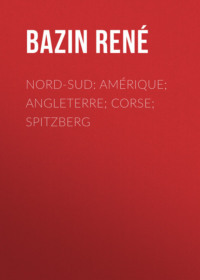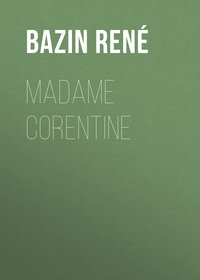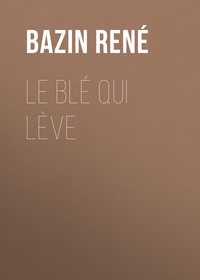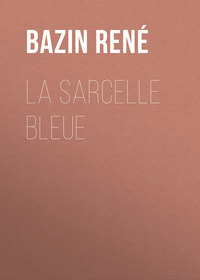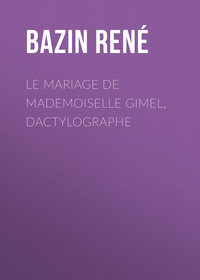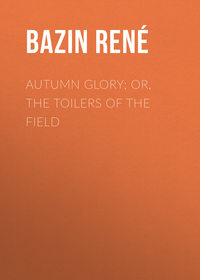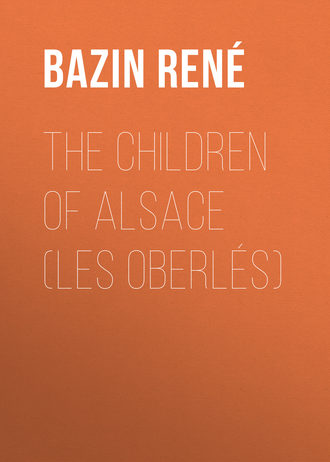 полная версия
полная версияThe Children of Alsace (Les Oberlés)
"And you? You, too, could have dined with the Councillor von Boscher, considering how intimate you are with these Germans. Did you not wish to follow your parents?"
"No."
The word was said decidedly, simply. But M. Ulrich had not got the information he sought. Yes, Jean Oberlé had certainly become a man. He refused to blame his family, to voice any opinion which would be an accusation of the others. His uncle continued with the same ironical accent:
"Nevertheless, my nephew, all the winter through your Berlin successes were dinned into my ears. They did not spare me. I knew you were dancing with our fair enemies. I knew their names."
"Oh, I beg you," said Jean seriously, "do not let us joke about these questions – like people who dare not face them and give their opinion. I have had a different education from yours, it is true, uncle – a German education. But that does not diminish my love for this country; on the contrary…"
M. Ulrich stretched his hand across the table and pressed that of Jean.
"So much the better," he said.
"Did you doubt it?"
"I did not doubt it, my child – I did not know. I see so many things that pain me – and so many convictions surrendered."
"The proof that I love our Alsace is shown by my intention to live in Alsheim."
"What!" said M. Ulrich, stupefied. "You give up the idea of entering the German Administration – as your father desires you should do? It is grave – a serious thing, my friend, to rob him of his ambition. You were the subject of the future. Does he know?"
"He suspects; but we have not yet had any explanations on the matter. I have not had time since my return."
"And what will you do?"
The youthful smile reappeared on the lips of Jean Oberlé.
"I shall cut wood, as he does, as my grandfather Phillipe does; I shall settle among you here. When I travelled in Germany and in Austria, after my examination, it was chiefly that I might study the forests, the saw-mills, and the factories like our own. You are weeping?"
"Not quite."
M. Ulrich was not weeping, but he was obliged to dry his wet eyelids with the tip of his finger.
"It would be for joy, in any case, my dear boy. Oh, for a true and great joy. To see you faithful to what I love best in the world. To keep you with us – to see you determined not to accept appointments and honours from those who have violated your country… Yes, it was the dream I dared no longer dream… Only, quite frankly, I cannot understand it. I am surprised. Why are you not like your father, or like Lucienne, who have so openly rallied to the enemy? You studied law in Munich, in Bonn, in Heidelberg, in Berlin; you have just passed four years in Germany, without speaking of your college years. How did you avoid becoming German?"
"I am less so than you."
"That is hardly possible."
"Less than you, because I know them better. I have judged them by comparison. Well, they are our inferiors."
"Well, I am pleased. We hear nothing but the opposite of this. In France, above all, the praise of the conquerors of 1870 continues without intermission."
The young man, touched by M. Ulrich's emotion, leaned no longer on the sofa, but bending forwards, his face lit up by the lamp, which made his green eyes appear more brilliant, said:
"Do not mistake me, Uncle Ulrich. I do not hate the Germans, and in that I differ from you. I even admire them, for in some things they are admirable. Among them I have friends I esteem greatly. I shall have others. I belong to a generation which has not seen what you have seen, and which has lived differently – I have not been conquered!"
"Happily, not!"
"Only the more I know them, the more I feel myself different from them; I feel I am of another race, with another category of ideals into which they do not enter, which I find superior, and which, without knowing why, I call 'France.'"
"Bravo, Jean, bravo!"
The old dragoon officer bent forward – he also was quite pale – and the two men were only separated by the width of the table.
"What I call France, uncle, what I have in my heart, like a dream, is a country where there is a greater facility for thought."
"Yes – "
"For speech – "
"That's it!"
"For laughter."
"How right you are!"
"Where souls have infinite shades of colour! A country that has the charm of a woman one loves, as it were a still more beautiful Alsace."
Both had risen, and M. Ulrich drew his nephew towards him, and pressed that fervent head against his breast.
"Frenchman!" said he, "Frenchman to the marrow of your bones, and in every drop of blood in your veins! My poor boy!"
The young man continued, his head still resting on the older man's shoulder:
"That is why I cannot live over yonder – across the Rhine – and why I shall live here!"
"Well might I say 'poor boy'!" answered M. Ulrich. "All is changed – alas! Even here in your home. You will suffer, Jean, with a nature like yours. I understand everything now – everything."
Then letting his nephew go:
"How glad I am I came to-night. Sit down there quite close to me. We have so much to say to each other – Jean, my Jean!"
They sat down side by side, happy, on the sofa. M. Ulrich stroked his pointed beard into its habitual well-groomed neatness. He recovered from his emotion, and said:
"Do you know that by speaking of France as we have spoken this evening, we have committed misdemeanours such as I delight in? It is not allowed. If we had been out of doors and Hamm had heard us, we should have been speedily dealt with – there would have been an official report!"
"I met him this afternoon."
"And I saw the son pass by in the depths of the wood just now. He is a non-commissioned officer in the Rhenish Hussars – the regiment which will soon be yours. Is that the carriage I hear?"
"No."
"Listen, then!"
They listened, gazing out of the window at the park, which was lit up by the full high moon; at the lawn in the shape of a lyre with its two white avenues, at the clumps of trees, and farther on the tile roofs of the saw-mill. Not a sound could be heard save the fall of the brook at the factory sluice, a monotonous sound which seemed now near, now far, according to the direction and strength of the freshening wind which was now blowing from the north-east, "from the Cathedral platform," as Uncle Ulrich said, thinking of Strasburg.
"No; what you hear," said Jean Oberlé, after listening for a while, "is the noise of the sluice. Father told the coachman to go to Molsheim to wait for the eleven-thirty train. We have time to chat."
They had time, and they made good use of it. They began to speak softly, without haste or difficulty, like those who have recognised that they agree on essentials and who can now safely open up all other questions, even the smallest. They spoke of the year's voluntary service Jean had been allowed to postpone until he was twenty-four, and of that new life he was going to begin at Strasburg – of the ease with which he could come nearly every Sunday to Alsheim. Then, this dear name having been repeated, uncle and nephew took pleasure in their recollections of the country, first of Alsheim, then of Sainte Odile, of the forest-dwelling of Heidenbruch, of Obernai, of Saverne, where the uncle had forests, of Guebwiller, where he had relations. It was Alsace they evoked. They thoroughly understood one another. They smoked, their legs crossed, seated one in each corner of the sofa, letting their words flow freely, and laughing often. Their conversation was so prolonged that the Black Forest cuckoo clock hanging over the door struck midnight.
"Do you suppose we have disturbed your grandfather?" asked M. Ulrich, getting up, and pointing with his hand to the wall which separated the young man's room from that of the sick man.
"No," said Jean; "he hardly sleeps at all now – I am sure it has pleased him to hear me laugh. As my family left me at five o'clock I spent a good deal of my time with him, and I watched him closely. He hears and understands everything. He recognised your voice, I am sure, and perhaps he has caught a word here and there."
"That will have pleased him, my boy. He belongs to the very old Alsace, that country which seems almost fabulous to you, and to which I also belong, although I am much younger than M. Oberlé. It was wholly French, that Alsace, and not a man of that time has changed. Look at your grandfather – look at old Bastian. We are the generation who suffered. We represent grief – we others. Your father embodies resignation."
"And I?"
Uncle Ulrich looked at the young man, with his far-seeing eyes, and said:
"You – oh, you are Romance."
They would have smiled, both of them, but they could not, as if that word had been too perfectly accurate, which is not always the case with human judgments – as if they felt that Fate was there in this room, invisible, who repeated to them at the bottom of their hearts at the same time: "Yes, it is true – "this one is Romance." The grief which was oppressing them was only to be explained by the imminence of life's mystery. It faded away. M. Ulrich reached out his hand to his nephew, more gravely than he would have done if that word had not escaped him, which he did not regret, but which remained present with him.
"Good-bye, dear Jean. I would rather not wait for my brother-in-law. I do not know what attitude I should take up towards him. All you have told me would embarrass me. You will wish him good night for me. I will go home through the woods by moonlight. What a pity I have not my gun with me and the good luck to come across a brace of grouse in the fir wood."
To reach the staircase he took some careful steps on the carpet in the passage.
"Uncle," said Jean, in a low tone, "if you would go to my grandfather I am sure he would be pleased – I am sure he is not sleeping."
Uncle Ulrich, who was walking in front, stopped and retraced his steps. Jean turned the handle of the door near which he was, and going first into the room, said, in a lowered voice:
"Grandfather, I bring you a visitor – Uncle Ulrich – who wishes to see you."
They were in the semi-darkness of a large room, the curtains of which had been drawn, and a nightlight, in transparent china, placed at the end of the room on the left between the closed window and a bed which occupied the corner, was the sole light. On the table beside the bed, in the little luminous halo which surrounded the nightlight, was a small crucifix of copper, and a gold watch, the only shining objects in the room. In the bed an old man was sitting rather than lying, his shoulders covered with a grey wool crossover, his back and head supported by pillows, his hands hidden under the sheets, which still kept the folds of the linen press. A tapestry riband, serving as bell-cord and finishing in a fringe, reached to the middle of the bed. The man who was sleeping or waking there was impotent. Life with him was withdrawing more and more within. He walked and moved with difficulty. He no longer spoke. Under his thick, pale cheeks his mouth moved only to eat and to say three words – three cries – always the same: "Hunger, Thirst. Go away!" A sort of senile laziness allowed his jaw to hang, the jaw that had commanded many men. M. Ulrich and Jean went to the middle of the room without his giving the least sign that he was conscious of their presence. This poor human ruin was, however, the same man who had founded the factory at Alsheim, who had raised himself from the condition of a little country proprietor, who had been elected protesting deputy, who had been seen and heard in the Reichstag, claiming the unrecognised rights of Alsace and demanding justice of Prince Bismarck. Intelligence was watching, imprisoned, like the flame which lit up the room that night; but it expressed itself no longer. In this uninterrupted dream what men and things must pass before the mental vision of him who knew the whole of Alsace, who had gone through it in every direction, who had drunk of its white wines at all the tables of the rich and the poor; traveller, merchant, forester, and patriot! And it was he – this wrinkled bald head, this lowering face, these heavy eyelids, between which a slow, sad eye slipped to and fro like a billiard ball in the immovable slit of a bell. However, the two visitors had the impression that his gaze rested on them with an unusual pleasure.
They kept silence so as to let the old man savour the sweetness of a thought they would never, never know. Then Uncle Ulrich went near the bed, and, placing his hand upon the arm of Philippe Oberlé, bending down slightly to be nearer his ear and to more easily meet his eyes, which were raised with difficulty:
"We have talked a good deal, M. Oberlé, your grandson and myself. He is a good fellow – your Jean!"
A movement of the whole upper part of the body slowly changed the position of the head of the old man, who was trying to see his grandson.
"A good fellow," continued the forester, "whose stay in Berlin has not spoiled him. He has remained worthy of you – an Alsatian, a patriot. He does you honour."
Though there was only the tiny floating light in the room, Uncle Ulrich and Jean thought they perceived a smile on the face of the old man, the answer from a soul still young.
They quietly withdrew, saying:
"Good night, M. Oberlé. Good night, grandfather."
The flame of the nightlight flickered, displacing lights and shadows; the door was shut, and the interrupted dream continued in the room, where hardly anything had entered since sunset save the hours struck in the belfry of the church of Alsheim. M. Ulrich and his nephew parted at the foot of the staircase. The night was cold, the grass all white with frost.
"Good time for walking!" said M. Ulrich; "I shall expect you at Heidenbruch."
He whistled for his dog, and stroking its red-brown head, said:
"Take me home, for I am going to dream all the time of what that boy told me!"
Scarcely had he gone some few hundreds of yards – the sound of his footstep could still be heard on the road going up towards the Wood of Urlosen – when in the calm of the night Jean caught the sound of the trotting horses coming from the Obernai district. The noise of their shoes striking the metalled road sounded like flails on a threshing-floor; it was a rural sound, and not disturbing; it broke no rest. Fidèle, who was barking furiously towards the edge of the forest, must have had other reasons to show her teeth and give tongue. Jean listened to the carriage coming nearer. Soon the noise grew less and less, then became deadened, and he knew that the carriage had passed between the walls of the village, or at least had entered the circle of orchards which made Alsheim in the summer a nest of apple-trees, cherries, and walnuts. Then it swelled and sounded clear like a train coming out of a tunnel. The gravel scrunched at the end of the avenue. Two lamps turned and passed rapidly across the park; the grass, the shrubs, the lower trunks of trees, arose abruptly out of the darkness and as abruptly sank back into it again, and the brougham stopped before the house. Jean, who had remained at the top of the staircase, went down and opened the door. A young girl got out at once; her face was rosy, and she was wrapped all in white – white mantilla, coat of white wool, and white shoes. In passing, almost in the air, she bent to the right, just touched Jean's forehead with a kiss, and half opened two lips heavy with sleep.
"Good night, little brother."
And picking up her skirt with a loose grasp, with wavering movements, her head already on the pillow as it were, she went up the stairs and disappeared into the vestibule.
"Good evening, my son," said the authoritative voice of a man. "You have waited for us; you were wrong. Come quickly, Monica, the horses are very hot. Auguste, you will give them twelve litres to-morrow. You would have done better to have gone with us, Jean. It was all very nice. M. von Boscher asked twice about you."
The person who spoke thus, now to one and now to the other, had had time to get out of the carriage, to shake hands with Jean, to turn towards Madame Oberlé, still seated in the back of the carriage, to go half-way up the flight of steps, to inspect with the eye of a connoisseur the two black horses, whose wet backs looked as if they had been rubbed with soap. His grey whiskers framed a full and solid face; his overcoat was unbuttoned, showing the open waistcoat and the shirt, where three Rhine stones shone; his oratorical hand only appeared a moment. After having given his opinion and his orders, Joseph Oberlé – vigilant master who forgot nothing – quickly raised his double chin and fixed his eyes on the end of the enclosure, where the pyramids of felled trees were resting, to see if there were any signs of fire visible, or if any shadow prowled round the saw-mill; then, nimbly mounting the second flight of steps two at a time, he entered the house. His son had answered nothing. He was helping Madame Oberlé out of the carriage, taking from her her gloves and fan, and asking:
"You are not so very tired, are you, mother darling?"
Her dear eyes smiled, her long mouth said:
"Not too tired; but it is not for me, now, my dear. You have an old mother!"
She leaned on the arm of her son – from a mother's pride more than from necessity. There was infinite sadness in her smile, and she seemed to ask Jean, at whom she looked while going up the steps, "You forgive me for having gone there? I have suffered."
She was wearing a black satin dress. She had diamonds in her hair, still black, and a collar of blue fox on her shoulders. Jean thought she looked like an unhappy queen, and he admired the elegance of her head, of her walk, and her fine carriage. She was of an old Alsatian family, and he felt himself the son of this woman with a pride he showed only to her.
He accompanied her, giving her his arm all the time so as to have the joy of being nearer to her, and to stop her on nearly every step of the staircase.
"Mamma, I have spent an excellent evening. It would have been delicious if only you had been there! Imagine, Uncle Ulrich came at half-past eight, and he only set out for home at midnight, just now."
Madame Oberlé smiled a melancholy smile and said:
"He never stops as long as that for us. He keeps away."
"You mean to say that he keeps away! I will bring him back to you."
She stopped in her turn, looked at this son, whom she had not seen since the afternoon, and smiled more gaily.
"You love my brother?"
"Better than I used to. I seem to have just discovered him."
"You were too young before."
"And how we have talked! We agree on all points."
The gentle maternal eyes sought those of her child in the twilight of the staircase.
"Oh, all?" she asked.
"Yes, mamma, on all!"
They had arrived at the top of the stairs. She placed her gloved finger on her mouth. She withdrew her arm which she had placed in that of her son. She was at the door of her room, facing M. Philippe Oberlé's room. Jean kissed her, withdrew a little, returned to her, and pressed her once again to his heart silently.
Then he took a few steps down the passage, looked again at this woman dressed in black, and whom mourning suited so well – so simple with her drooping white hands and her erect head, so firm of feature, so gentle in expression.
He murmured gaily:
"Saint Monica Oberlé, pray for us!"
She did not seem to hear him, but she remained, her hand on the door-handle without entering, as long as Jean could see her, Jean, who was going backwards step by step, farther away, into the shadows of the passage.
He entered his room, his heart joyful, his mind full of thoughts, all those thoughts of the past evening coming back now with swift flight in the solitude of the present. Feeling that he would not sleep at once, he opened the window. The cold air blew steadily from the north-east. The mist had fled. From his room Jean could see, beyond the wide strip of cultivated hilly ground, the forests where Shadow all night long wound and unwound her folds, away to the heights crowned here and there by a spiked cluster of ancient woods, which broke the line of hills and wreathed itself about in stars. He tried to find the house of M. Ulrich. And in thought he saw again him who ought to be arriving home, when voices began to sing on the edge of the forest. A shiver of pleasure seized the nerves of the young man, who was a passionate musician. The voices were beautiful, young, and in tune. There were more than twenty of them certainly, perhaps thirty or fifty. He missed the words because of the distance. It was like the sound of an organ in the night. They flung out to the wind of Alsace a song of a spirited rhythm. Then three distinct words reached Jean's ears. He shrugged his shoulders, irritated with himself for not having understood at once. It was a chorus of German soldiers coming back from the manœuvre of those Rhenish Hussars M. Ulrich had met coming down the mountain. According to custom, they sang to keep themselves awake, and because there was in their songs the power of the word Fatherland. The horses' hoofs accompanied the melody like muffled cymbals. The words escaped and vibrated:
Stimmt an mit hellem hohen Klang,Stimmt an das Lied der Lieder.Des Faterlandes Hochgesang,Das Waldthal hall es wieder."Jean would have been glad to stop the song. How many times, however, and in all the German Provinces, had he not heard the soldiers sing? Why should he feel sad at the song of these men? Why did the words enter into his soul so painfully, although he knew them and could repeat them from memory? When some two hundred yards from the village they became silent. Only the clatter of hoofs continued drawing nearer to Alsheim and echoing above it. Jean leaned forward to see the horsemen pass in the little market town. He could see them through a large opening in the wall surrounding the park, secured by an iron gate just in front of the house – a moving mass in a brown dust that the wind blew back, leaning like barley beards in the ear. The men were not to be distinguished from each other, nor the horses. Jean thought, with a secret and increasing pain, "How many there are!"
At Berlin, at Munich, at Heidelberg, they only aroused an idea of strength without any immediate aim or object. The enemy had not been specially singled out; it was everything opposed to the greatness of the German Empire. Jean Oberlé had more than once admired the march of regiments and the wonderful power of the man who commanded so many men. But here on the frontier, on the ground still bloody with the last war, there were memories which showed only too well who was aimed at and threatened. The sight – the noise – of the soldiers made him dream of butcheries, of death, and of the fearful mourning which remains. They were passing between the houses. The noise of the squadrons, of men and beasts shook the windows. The little town seemed asleep. Neither the soldiers nor their leaders noticed anything; but in many of the houses a mother woke and sat up in her bed, shivering; a man stretched out his fist and cursed these conquerors of past days. God alone knew the drama. They passed by. When the last squadron had finished throwing shadows across the road, between the two pillars of the gate, Jean thought he saw, in the dust that was settling, a horseman facing the house. Was the horse refusing to advance? No; he was at rest. The horseman must be an officer – something golden placed in several rows across his breast sparkled. He did not move, firm in his saddle, young certainly, he gazed in front of him. This lasted scarcely a minute. Then he lowered the sabre he held in his hand, and having saluted, put spurs to his horse, which rushed away. The scene had been so quick that Jean might have thought it an illusion, if the gallop of the beast had not sounded in the village street.
"Some Teutonic joke," he thought – "a way this officer has found of saying that the house pleases him! Thanks!"
The regiment had already left the village and ridden away to the wide plain. The houses had gone to sleep once more. The wind blew towards the green Vosges. In the opposite quarter, far away now, like a religious hymn, rose again the song of the German soldiers, who were celebrating the German Fatherland whilst marching towards Strasburg.
CHAPTER II


